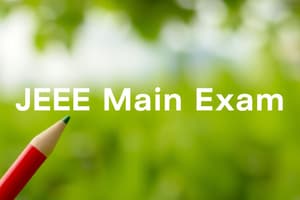Podcast
Questions and Answers
What is the main focus of the Chemistry syllabus mentioned?
What is the main focus of the Chemistry syllabus mentioned?
- Analytical Chemistry
- Inorganic Chemistry
- Biological Chemistry
- Physical Chemistry (correct)
Which branch of Mathematics is emphasized in the preparation tips?
Which branch of Mathematics is emphasized in the preparation tips?
- Algebra (correct)
- Statistics
- Calculus
- Geometry
What does 'Le Chatelier's principle' relate to in Chemistry?
What does 'Le Chatelier's principle' relate to in Chemistry?
- Redox reactions
- Acid-Base reactions
- Equilibrium reactions (correct)
- Thermochemistry
Which type of questions require quick solving according to the text?
Which type of questions require quick solving according to the text?
What is recommended regarding preparation timing in the text?
What is recommended regarding preparation timing in the text?
What is the goal of reinforcing fundamental concepts according to the text?
What is the goal of reinforcing fundamental concepts according to the text?
Which subject areas are covered in the JEE Mains examination?
Which subject areas are covered in the JEE Mains examination?
What is NOT a key area tested in the Physics section of the JEE Mains exam?
What is NOT a key area tested in the Physics section of the JEE Mains exam?
Which aspect of Chemistry is NOT mentioned in the text?
Which aspect of Chemistry is NOT mentioned in the text?
What can greatly enhance understanding and problem-solving ability in Physics according to the text?
What can greatly enhance understanding and problem-solving ability in Physics according to the text?
What serves as the gateway into prestigious engineering institutions across India?
What serves as the gateway into prestigious engineering institutions across India?
Which subject is NOT evaluated in the JEE Mains examination?
Which subject is NOT evaluated in the JEE Mains examination?
Flashcards are hidden until you start studying
Study Notes
Joint Entrance Examination (JEE) Mains Overview
The Joint Entrance Examination (JEE) Mains is a national-level entrance examination conducted by the National Testing Agency (NTA). It serves as the gateway into prestigious engineering institutions across India. This comprehensive exam evaluates students' proficiency in three main subjects: Physics, Chemistry, and Mathematics (PCM). In this article, we'll delve deeper into each subject area and offer insights into optimizing your study approach based on past trends and best practices.
Physics
Physics covers a wide range of concepts from classical mechanics to quantum mechanics. Some key areas tested include:
- Mechanics: Newtonian mechanics, kinematics, work & energy, rotational motion, momentum & collisions, elasticity
- Electromagnetism: Electric fields and potentials, magnetic fields, circuits
- Thermodynamics: First law, Second Law
- Oscillations and Waves: Simple harmonic motion, waves in one dimension, wave optics
- Optics: Reflection and refraction, geometrical optics, interference
- Modern Physics: Atomic Physics, Nuclear Physics, Solid State Physics
Practice problems and concept reinforcement through simulation tools like Virtual Labs can greatly enhance understanding and problem-solving ability.
Chemistry
Chemistry encompasses organic, inorganic, physical, and biochemical aspects with questions often requiring an application-based approach to real life scenarios. Key areas covered in the syllabus include:
- General Principles of Chemistry: Stoichiometry, periodic table, chemical bonding, atomic structure
- States of Matter: Gases, liquids, solids
- Solutions: Colligative properties, electrolytic conductivity
- Equilibrium: Le Chatelier's principle, ICE method
- Redox Reactions: Oxidation numbers, balanced equations
- Hydrogen (& other nonmetals): Formation & dissociation enthalpy, hydrides
- p-block elements: Main group chemistry
- d- & f- block elements: Coordination compounds, complex ion formation
- Organic Chemistry: Aliphatic hydrocarbons, alcohols, aldehydes, ketones, carboxylic acids, amines, benzene derivatives
To excel, focus on learning the fundamentals while also practicing calculating equilibrium constants, thermodynamic quantities, redox reactions, and organic synthesis pathways.
Mathematics
Math is one of the largest sections covering algebra, trigonometry, analytical geometry, and calculus. Topics within these broad domains include:
- Sets, Relations, Functions
- Algebra: Linear equations, polynomials, quadratic equations
- Trigonometry: Angles, identities, graphs
- Analytical Geometry: Straight lines, circles, conic sections
- Calculus: Limits, differentiation, integration, applications
- Vectors and Three Dimensional Geometry
Master foundational concepts before moving onto more advanced applications and practice solving questions quickly, as time constraints play a significant role during the actual test.
Preparation Tips
- Start early: Allocate adequate time for studying and revising material. Begin preparing several months prior to the test date.
- Focus on basics: Reinforce fundamental concepts. Foundation building will further strengthen higher order thinking skills required in more challenging problems.
- Practice regularly: Apply concepts learned to solve past papers and mock tests every week. Solve questions in timed conditions similar to those encountered in the exam.
- Seek guidance: Attend coaching classes or seek personal tutoring when necessary if you need additional support or clarification regarding specific topics.
- Stay updated: Check the latest updates regarding changes to the syllabus or pattern of the exam to avoid any last minute surprises.
By following these guidelines and maintaining consistency throughout your preparatory journey, you increase the likelihood of achieving success in the Joint Entrance Exam (Main), which opens doors to pursuing engineering studies at many renowned Indian universities.
Studying That Suits You
Use AI to generate personalized quizzes and flashcards to suit your learning preferences.




